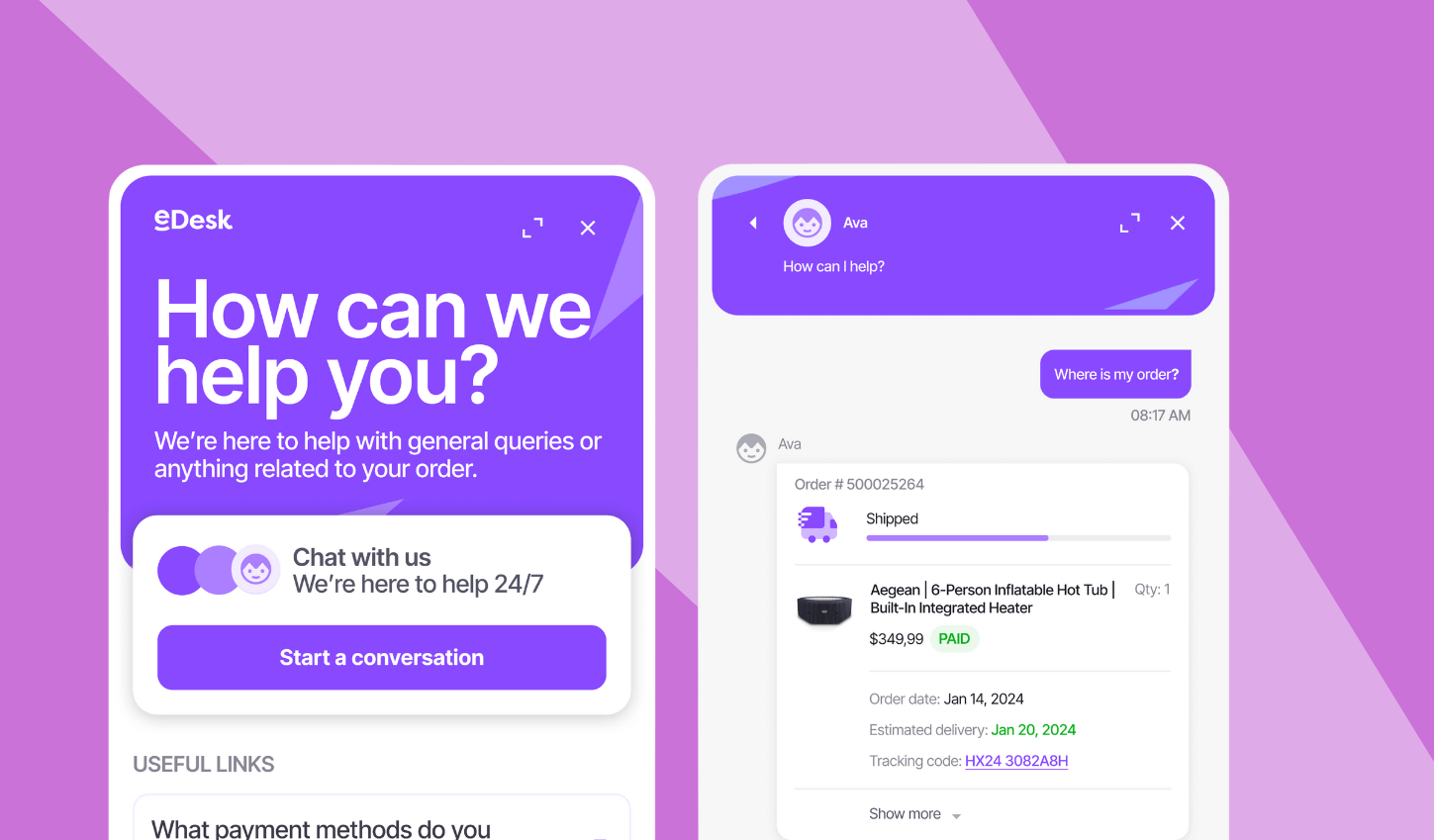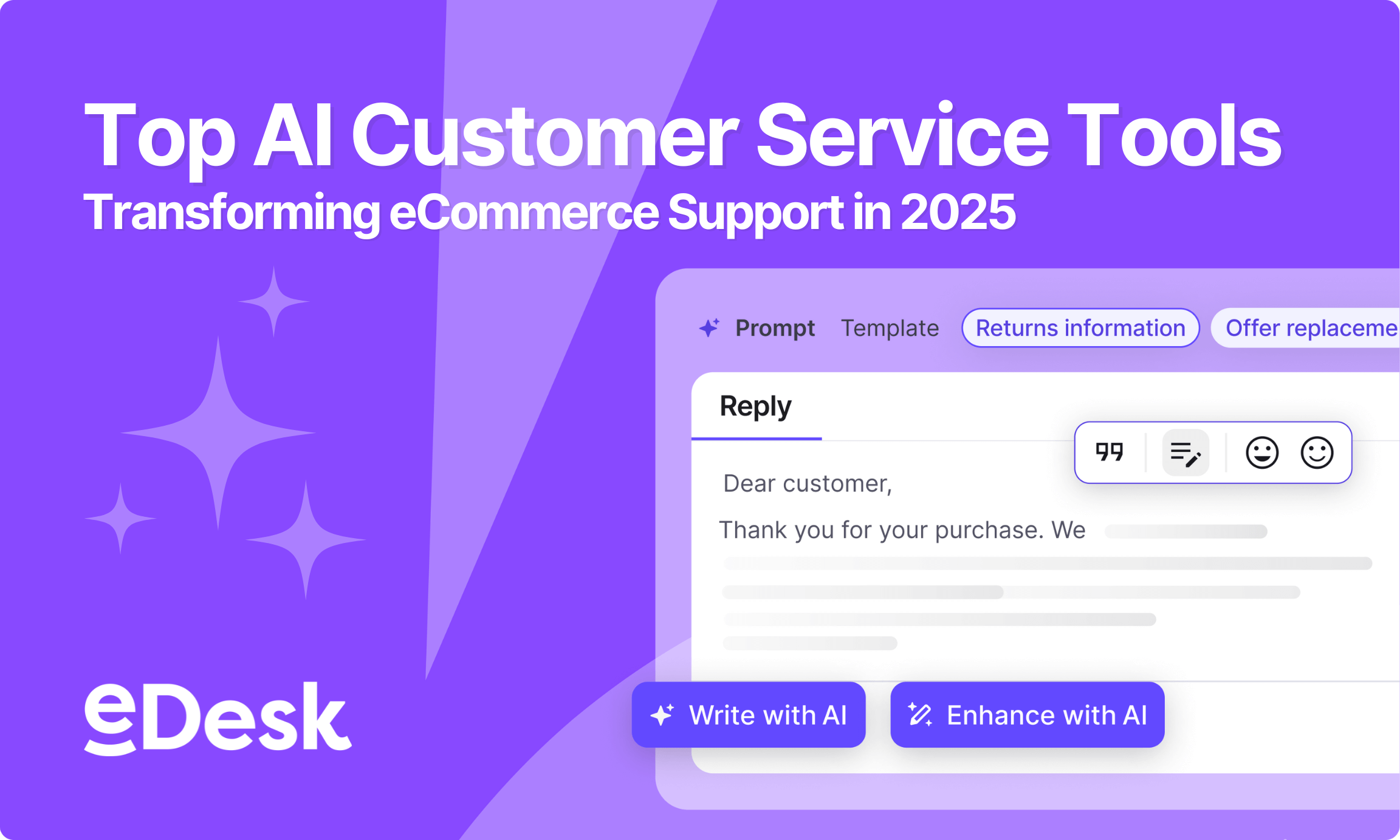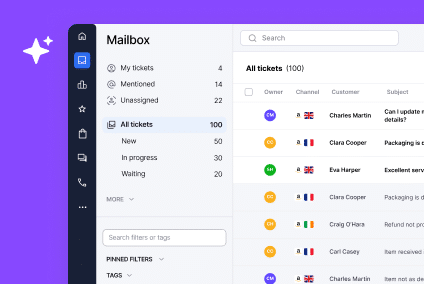It’s no secret that AI is changing the face of global industries, and this is no different for customer service. Companies can now provide faster, more personalized, and more efficient help thanks to customer service AI tools like chatbots and predictive analytics. These developments are having a concrete impact: 59% of customers believe generative AI will transform how they interact with businesses in the next two years. In this blog, we’ll go over everything you need to know about AI customer support software in 2025, including the latest updates, smart implementation tactics, and real-world success stories.

What Are AI Customer Service Tools?
Customer service AI tools leverage artificial intelligence to automate, streamline, and improve customer care. These tools help businesses to:
- Provide 24/7 support without increasing costs
- Personalize interactions according to customer behavior and preferences
- Reduce response times and increase accuracy
- Anticipate and resolve customer issues
Overall, artificial intelligence support can help eCommerce organizations scale support during busy seasons, reduce cart abandonment, and boost customer retention.
Key Types of AI Customer Service Tools
AI-Powered Chatbots and Virtual Assistants
AI chatbots are a modern convenience that are commonplace in everyday life as well as in eCommerce. They can answer questions, walk people through purchases, and even process returns. Unlike traditional chatbots, new chatbots employ machine learning to improve accuracy over time and are multilingual by default.
Natural Language Processing (NLP)
62% of consumers now expect AI to understand their emotions and context better – this is where NLP comes in. NLP enables AI to interpret human language, both written and spoken. This is the cornerstone for intelligent chatbots, voice assistants, and sentiment analysis technologies. NLP enables AI to comprehend context, recognize emotion, and give relevant replies in real time.
Predictive Analytics
Predictive analytics forecasts client demands by combining historical data with AI systems. This enables businesses to anticipate demand, manage issues before they develop, and allocate resources efficiently.
Sentiment Analysis
AI tools can use tone and grammar in customer messages to evaluate sentiment. This enables teams to prioritize tickets, de-escalate angry customers, and track brand health across digital channels. 70% of organizations today are investing in tools that analyze customer messages, underlining the importance of sentiment analysis in eCommerce.
Automated Ticketing and Routing
AI has the power to identify, prioritize, and route incoming messages to the appropriate agents or departments, resulting in shorter wait times and faster resolution.
AI-Enhanced Knowledge Bases
AI-powered search and recommendation engines improve the usefulness of knowledge bases by allowing customers and agents to quickly locate relevant answers. This minimizes support calls and improves self-service.
How to Succeed in an AI-Driven Customer Service World
1. Stay Human-Centric
AI should assist, not replace, human agents. The most successful businesses blend AI efficiency with human sensitivity. AI can manage repetitive jobs, whereas agents specialize in sophisticated, emotive, or high-stakes conversations.
2. Upskill Your Teams
Customer service AI tools are only as useful as the people behind them. Train your employees to collaborate with AI, grasp data insights, and administer tools effectively.
3. Let Data Drive Decisions
AI adds enormous value when it has access to clean, structured customer data. Use artificial intelligence to uncover patterns, enhance procedures, and inform customer experience initiatives.
4. Implement AI Responsibly
Ethics and compliance are important considerations when it comes to AI. Make sure your AI technologies follow privacy rules (such as GDPR and CCPA), minimize bias, and communicate with users.
5. Keep Innovating
AI is constantly evolving. eCommerce businesses that continuously experiment with new tools, collect feedback, and optimize workflows will maintain a competitive advantage.
Implementing AI-Powered Customer Service
Start with a Clear Roadmap
Identify areas where AI can have an immediate impact, such as reducing response time or automating tickets. Collaborate with cross-functional stakeholders to align AI aims with overall business objectives.
Test with Pilot Programs
Prior to implementation, run trial initiatives. Measure AI effectiveness, collect customer feedback, and fine-tune techniques to ensure that these technologies benefit rather than hinder your team.
Prioritize Data Quality and Security
AI needs clean data to function properly. Ensure that your customer information is correct, up-to-date, and securely stored. Strong security policies will also help you stay compliant and build trust.
Train Your Agents
Empower agents to make efficient use of AI tools. Agents can work faster and more precisely with features such as eDesk’s automatic ticket translation, AI-powered message summaries, and smart tagging.
Monitor and Iterate
Continuously monitor performance indicators such as CSAT, resolution times, and agent productivity, and adjust your AI models based on real customer feedback.

Why Businesses Choose eDesk for AI Customer Support
eDesk is at the forefront of AI-powered eCommerce customer care. Our customer service tools assist teams by:
- Summarizing long messages for quick allocation
- Automatically categorizing and prioritizing incoming tickets
- Translating requests in multiple languages
This allows for faster reaction times, improved agent efficiency, and scalable support across multiple channels. eDesk’s AI automation tools help businesses streamline customer service operations by reducing response times and improving query resolution rates. Companies using eDesk have reported increased efficiency and higher customer satisfaction levels with agents resolving up to 73% more customer queries across all channels.
Key Takeaways
- AI is transforming customer service by providing tools that increase speed, personalization, and efficiency
- Success comes from blending AI automation with human empathy
- Clean data, team training, and appropriate AI practices are critical
- Real-world case studies from 2025 demonstrate the benefits of AI customer service across industries
- eDesk’s AI solutions are designed specifically for eCommerce, allowing organizations to seamlessly scale support
FAQs About AI for Customer Service
What are the best AI tools for customer service in 2025?
Top tools include artificial intelligence chatbots (such as eDesk’s smart assistant), sentiment analysis platforms, predictive analytics, and AI-powered ticketing systems.
What are the benefits of using AI in customer service?
AI lowers costs, speeds up resolution, personalizes support, and allows for 24-hour availability – all of which are very beneficial to global eCommerce businesses.
Is there a free AI customer service tool?
Some platforms provide free trials (such as eDesk) or limited-feature versions. These can be an excellent starting point before committing to a full-fledged solution.
Can AI fully automate customer service?
Not exactly. AI may do repetitive and routine jobs, but human agents are still required for complex, emotional, or high-stakes situations.
The Future of AI in Customer Service
As AI technology becomes more integrated in our everyday lives, it’s clear that businesses that adopt it will be better positioned to meet customer expectations. In 2025 and beyond, AI will be a major enabler for scaling operations, improving reaction times, and increasing customer happiness.
Are you ready to experience the power of artificial intelligence for your support team? Try eDesk for free today.




